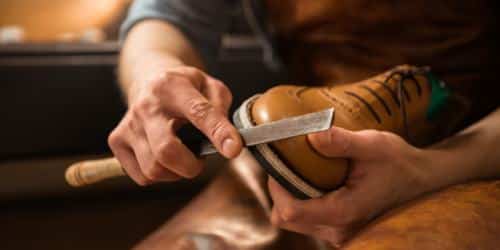One industry in Nigeria that has existed since the beginning of buying and selling is the shoe industry. And it will not finish or fade because shoes are a necessity that we cannot live without. Yes, just as we wear clothes to cover our nakedness and be fashionable, we wear footwear to protect our toes, and they are here to stay. Aside from protecting our toes from sharp items and the cold, we also wear shoes to look fashionable.
Indeed, it is thought that the sort of shoe a guy wears determines whether he is wealthy or impoverished. This is why the Nigerian shoe industry, like the Nigerian garment industry, is profitable.
What is Shoemaking?
Shoe-making is the process of creating shoes, which includes designing, cutting, and assembling the materials. It is a specialist craft that requires a variety of abilities, such as pattern-making, stitching, and glueing. Some shoes are handcrafted, while others are machine-made.
Does the Shoe Manufacturing Business Make Money?
The shoe business in Nigeria, particularly when selling online, may be quite profitable. This is because it saves you money while increasing your earnings.
It saves you a lot of money in the sense that it spares you the cost of renting a store for your shoe business, as well as other costs related to renting a shop such as power costs, salaries, and so on. The only substantial cost for the shoe company in Nigeria that has to do with selling online is the cost of shipping.
And if you are unwilling to pay for it, you can pass it on to your customers. So, with a firm like this, you are essentially the author and finisher of your product.
Why Should I Start a Shoe Manufacturing Company?
Aside from providing a creative outlet, beginning a shoe-making business has several other advantages.
#1. Demand is Really High
The footwear sector is continuously in high demand. Demand for footwear is increasing as the population grows and purchasing power grows.
#2. Possibilities for Creativity
Shoemaking is a creative and self-expression-based art form. Starting a shoemaking business allows you to design and create one-of-a-kind and custom-made footwear.
#3. Profitability Potential
A shoe-making company has the potential to be extremely profitable. Shoes are a high-margin product with a large profit margin if you use the proper price approach. You may control costs and quality by manufacturing your shoes, resulting in larger profit margins.
#4. The Creation of New Jobs
Starting a shoe-making firm can also help the economy by creating jobs. Hiring competent employees not only provides employment possibilities but also contributes to the community’s growth.
Starting a shoemaking firm can also have a positive impact on the social and environmental landscape. By manufacturing shoes locally, you lower the carbon impact involved with importing footwear from other countries.
#6. Fulfillment
Starting a shoemaking business can be a rewarding experience. The thrill of inventing a product from the ground up and seeing it worn by happy customers may be quite satisfying. Furthermore, the company can create a sense of purpose and identity.
How to Begin a Shoe Manufacturing Business in Nigeria in 2023
Following these steps will allow you to develop a shoe-making business that satisfies the demands of your target audience, contributes to the growth of the Nigerian economy, and meets your entrepreneurial objectives.
#1. Training
All you need to do is find a reputable shoemaker or manufacturer to learn and master the skills. Choose a high-quality shoemaker even if it is out of your way in terms of distance or location. Remember, there is no gain without pain. You can only succeed in the shoe industry if you know (or learn) how to make various types of shoes on your own.
#2. Create a Business Plan
To start a shoe-making business, you must have a well-thought-out business plan on hand. Your company plan should include goals and objectives, marketing, funding, and management strategies, as well as a SWOT analysis. If you can’t do it yourself, you can hire a freelancer to help you develop a detailed business plan on how to start a shoe business, or you can get one online for a fee.
#3. Find a suitable site
It could be your house or a rented area where your consumers can readily find you. At this point, you should have identified your target audience. In essence, you should have selected who you want to please with your offering. When ready, you can start a shoe manufacturing business from home and place it on display for sale in a very attractive strategic area that is highly frequented/patronized by your target demographic.
#4. Choose a Business Name
A business name is the name by which your shoe company will be known. When heard, it should convey what you are interested in and those to whom it is addressed. Your company name should be concise, significant, and easy to remember.
#5. Register your company
Before you begin or expand your shoe business, make sure you contact the necessary bodies or organizations and register your company.
Individuals prefer to do business with registered firms. If you want to start your own shoe business in Nigeria, you can contact the shoe producers organization and register your company with the Cooperation Affairs Commission.
#Step 6. Purchase the Necessary Equipment
A shoemaker or manufacturer who lacks the requisite production materials is analogous to a local farmer who lacks a hoe and a cutlass. When purchasing equipment or materials for shoe or footwear production, your experience is extremely significant. Because there are many phoney or low-quality materials available.
Remember that the quality of your materials will also impact the quality of your shoes when the manufacturing process is over.
#7. Create High-quality Footwear
With all of the necessary supplies in place, the next step is to begin manufacturing shoes.
Conduct a market analysis. You’ll learn what’s popular and well-liked by your target audience as a result of your research.
#8. Brand, Label, and Package your Footwear
To begin, you must establish a name, symbol, emblem, or other thing that will be used to differentiate your shoes or footwear from others. To label a shoe, add a few details about the materials used in the production of such shoes and attach it to the shoe.
Your label could be symbols or text and should be placed on the outside or inside of the shoe. For each pair of shoes, you must develop or design a wrapper or box-like container. This protects your shoes, allows for easy identification, and pleases your customers.
#9. Promote your Shoes
Aside from using a showroom to raise awareness about your goods, another way is to use media advertisements. Before working with them, make sure you consider media attention or traffic. The more traffic there is, the better. You can also contact a renowned blog in your country or region for assistance in publicizing your sneaker. Make a banner and place it in the header segment, as well as on the blog’s homepage and footer.
What Tools Are Required to Make Shoes?
To make shoes, you’ll need a variety of instruments, from basic hand tools to specialist machines. Each piece of machinery has a distinct function in the manufacturing process.
- Scissors of various sizes: Basically, the Nora required material cutting (the Nora is a type of leather used for the tops of palms).
- Knives: To cut hard leather.
- Machine for filling: For filling and smoothing leather surfaces, as the name suggests. It can also be used for finishing.
- Sandpaper: During shoe production, sandpaper is attached to the filling machine; it is required because the surfaces of two leather surfaces must be roughened before they are glued together. A wire brush may also be utilized.
- Machine for sewing: Used to stitch leather pieces together. It is also utilized in design.
- Needle and thread: To stitch in locations where the machine cannot, as well as to create designs.
- Punches: To make cavities (holes) for pins, hooks, rings, and other small objects.
- Shoe fashion: Usually or sometimes referred to as a pattern. It has the form or shape of a human foot. The shoe is constructed in several sizes. It’s made of wood or plastic.
- Other materials or tools required are gums, tape and ruler (for measuring), nails, hammers, shoe soles, and so on.
Important Factors To Consider Before Starting a Shoe Business
Before launching a shoe business, numerous critical things must be considered, including
#1. Understand your Target Audience
The first thing you should think about is who you want to please with your product. Are you beginning to target and gratify women or men, children or adults, formal or casual, and so on?
With this already decided, your production will be relatively simple.
You can easily decide what to cook because you know the type of people you want to feed. What I mean is that it’s easier to produce if you know who or what kind of people will use it. Create shoes with your intended audience in mind.
#2. Type of business. [society, sole proprietorship]
Do you want to start and run your own shoe business or collaborate with a friend?
Do you intend to operate as a sole proprietor (one-man business) or are you willing to form a partnership with someone who shares your goals? This must also be taken into account. Because it will allow you to create an excellent business plan that will see you through the shoe business.
#3. The size/scale of the company
Are you going to start small or big? Shoe manufacturing allows for a wide range of sizes. In essence, this is a business that can be started on a large, medium, or small scale. However, the small scale is the most widely used in Nigeria.
Starting small allows you to start your shoe business from home and maximize your capital. And, in my opinion, it’s not a bad way to start a shoe business.
You can start small and expand over time.
What are the Six Steps in the Process of Making a Shoe?
The different processes included in making a shoe are:
- The Design Team.
- The Shoe Last Department.
- Stamping and Sewing.
- Assembling the Shoe.
- Step Insoles and Decoration.
- The Shoe Room.
What are the Steps in the Shoe Manufacturing Process?
Generally, the shoe production process undergoes six crucial processes before a quality product gets to a devoted customer. The initial stage is design, followed by stamping, stitching, assembly, and finishing. The final step is the shoe room, which might not be what you might be anticipating.
Is Shoemaking a Good Business?
Shoes are always in demand any time of the year consequently anyone requires a good pair of shoes or shoes. This makes it a very lucrative… Shoes are always in demand any time of the year consequently everybody wants a good pair of shoe or shoes. This makes it an extremely lucrative business.
What Tools Are Required to Make Shoes?
Shoe manufacture comprises multiple stages, and each requires specialized technology. Some of the popular types of shoe-making machines are cutting machines, skiving machines, sewing machines, lasting machines, and finishing equipment.
How to Sell Shoes Successfully?
By studying the market, identifying a niche, and finding a dependable supplier, you may set yourself up for success. It’s also crucial to develop a professional online store with clear and appealing product images and to leverage SEO and social media to your advantage.
Conclusion
Shoe-making is a successful business, and you will almost certainly succeed because many people are beginning to patronize Nigerian-made items. Footwear is a vital accessory that completes an outfit. Everyone requires shoes at some point in their lives for many reasons such as employment, marriage, coronation, sports competition, fashion shows, school, official and informal occasions, and so on. Learn the skill, it’s a good business idea.
- The World’s Best SHOE BRANDS for Women, Men & Running (Updated)
- SHOE BRANDS FOR WOMEN: 17 Most Popular Picks & 2023 Reviews (Updated)
- HOW TO MANUFACTURE A PRODUCT: Step-By-Step Guide to Turn Your Idea Into a Product
- NEW BALANCE LOGO: History and Meaning
- SKATE SHOE BRANDS: List of the Best Skate Shoe Brands in 2023 (Updated)






